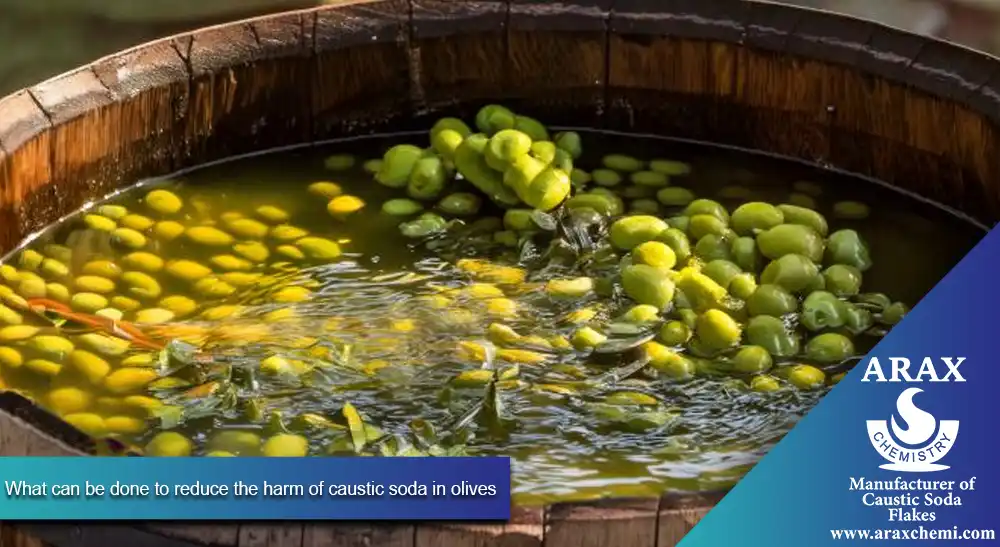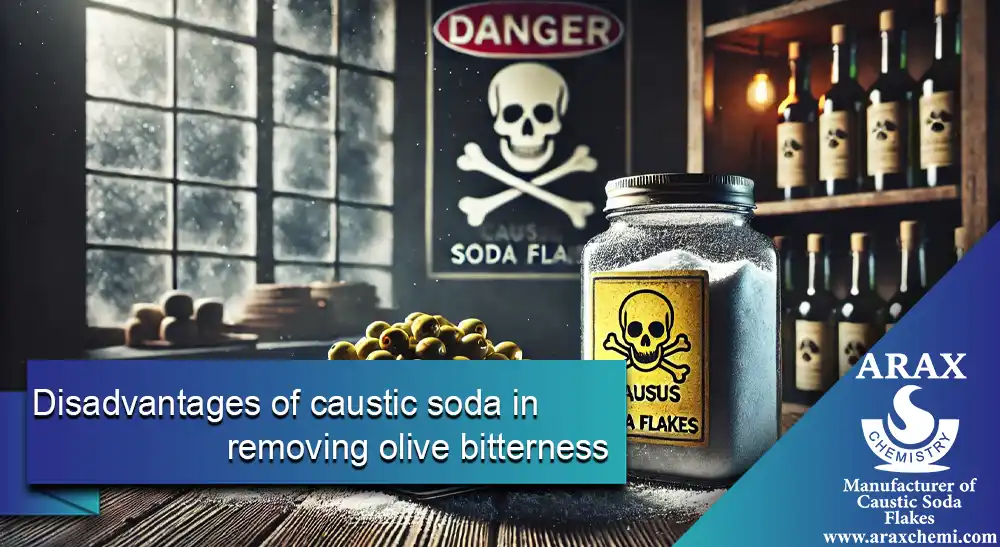Fresh olives are very bitter due to a compound called oleuropein, making them nearly impossible to eat. Therefore, after harvesting this fruit, their bitterness is removed using various methods. But how can we reduce the bitterness of olives, and is there a simple solution for Sweetening olives with Caustic soda? One of the quickest and most effective methods to eliminate the bitterness of olives is to use caustic soda solution. Caustic soda, also known as sodium hydroxide, soda lye, and pearl soda, is a strong alkaline substance widely used in the food industry. However, the disadvantages of this substance cannot be overlooked. In this article, we will address some of the most significant drawbacks of caustic soda, such as gastrointestinal, cardiac, renal, and allergic issues, and we will examine some ways to prevent these problems.
Is it necessary to remove the bitterness of raw olives?
Yes. Eating raw olives can be harmful to human health due to the bitter compound oleuropein. Additionally, raw olives contain a very high level of tannins, which can lead to symptoms like stomach irritation and gastrointestinal issues when consumed in excess. Moreover, raw olives may harbor harmful bacteria, leading to food poisoning. To prevent such risks, raw olives can be prepared using food-grade caustic soda. However, the use of caustic soda to remove bitterness can have its disadvantages, which we will discuss in the next section.
Disadvantages of caustic soda in removing olive bitterness
Given the many disadvantages of this substance for living beings and nature, some individuals may wonder if caustic soda is carcinogenic. In response, it should be noted that while caustic soda does not directly cause cancer, continuous contact with this substance and neglecting safety precautions can lead to scarring and tissue damage in vital organs such as the lungs and digestive system, indirectly increasing the risk of cancer.
However, food-grade caustic soda has a lower percentage of impurities and is less harmful compared to regular caustic soda. When purchasing caustic soda for olive bitterness removal, be aware that the price of food-grade caustic soda differs from that of regular caustic soda.
Some of the most significant disadvantages of caustic soda include:
- Gastrointestinal problems: If olives are not thoroughly washed after using sodium hydroxide and its residues remain, eating them can result in burns to the mouth or digestive system. These reactions are more pronounced in individuals with sensitive mucous membranes or stomachs.
- High blood pressure and stroke: Consuming olives that have not been adequately washed after soaking in sodium hydroxide can lead to issues such as high blood pressure, increased risk of heart disease, kidney problems, and even stroke.
- Allergic reactions: Allergic reactions caused by olives and those washed with sodium hydroxide are very rare. However, some individuals may experience allergic reactions such as skin rashes and itching after consuming olives processed with caustic soda.
Does using caustic soda to reduce olive bitterness lead to death?
Using caustic soda to reduce olive bitterness can be dangerous if not done correctly. If this substance is misused or in inappropriate amounts, it can be extremely harmful and cause serious side effects. Particularly, if olives are not adequately washed after using this substance, and residues remain, it can lead to poisoning and even death.
Therefore, the use of caustic soda to prepare olives should be done with caution and under the supervision of experts. Using natural and safer methods for reducing olive bitterness, such as soaking in brine or fermentation, is a better option. If you have specific questions or concerns, be sure to consult with a specialist.
What can be done to reduce the disadvantages of caustic soda in olives?

The best strategies to avoid unwanted problems after consuming olives processed with caustic soda include:
Thorough washing after soaking olives in caustic soda: Once you have removed the bitterness from the olives, you should wash them thoroughly to eliminate any remaining caustic soda. When caustic soda is adequately washed away, the risk of chemical burns and other disadvantages is eliminated.
Proper dosage of sodium hydroxide: It is advisable to measure the amount of caustic soda used in the bitterness removal process according to instructions and avoid adding excessive amounts to your solution.
Purchasing caustic soda from a reputable manufacturer: One of the most critical factors affecting the quality and standard of caustic soda is its manufacturer. The better the manufacturer adheres to standards and uses appropriate equipment in the production and packaging processes, the better the final product will be and, consequently, the fewer risks it will pose.
last word
The bitterness of fresh olives is an inseparable part of them. Eating bitter olives is harmful to humans, and therefore, their bitterness must be removed using available methods before consumption. One of the best methods for removing olive bitterness is soaking them in caustic soda, which takes less time to sweeten compared to traditional methods.
Other methods for reducing bitterness without NaOH require more time and patience. However, purchasing caustic soda and using it in the sweetening process can come with disadvantages such as gastrointestinal, cardiac, renal, allergic issues, and more. To prevent such problems, it is essential to wash the olives thoroughly with plenty of water after sweetening them. Additionally, caustic soda should be purchased from a reputable manufacturer and used according to specified instructions to avoid unwanted problems and poisoning.
Frequently Asked Questions
- Is using caustic soda to reduce olive bitterness safe?
No, improper use of caustic soda can lead to poisoning and health risks. This substance is toxic, and if residues remain in olives, it can cause serious side effects. - What side effects might occur after consuming olives contaminated with caustic soda?
Possible side effects include burning in the mouth and throat, nausea, vomiting, stomach pain, and in severe cases, damage to internal tissues and even death. - How can it be ensured that olives are safe after using caustic soda?
Olives should be thoroughly washed to ensure no residues of caustic soda remain. It is also better to use natural and safer methods for reducing bitterness. - Are there other natural methods for reducing olive bitterness?
Yes, soaking olives in brine or fermenting them in salt solution are safe and effective methods for reducing bitterness. - Can consuming olives treated with caustic soda have long-term effects?
Yes, the regular consumption of olives contaminated with caustic soda can lead to long-term health issues, including gastrointestinal problems and even serious diseases. - How can risks associated with using caustic soda be prevented?
Using natural methods to reduce olive bitterness and consulting food specialists before using chemicals to prepare olives can help prevent risks. - Do signs of poisoning from consuming olives contaminated with caustic soda appear immediately?
Symptoms of poisoning may not appear immediately after consuming contaminated olives. In some cases, it may take several hours or even days for symptoms to manifest. - What actions should be taken if symptoms of poisoning occur?
If symptoms of poisoning arise, one should immediately seek medical attention and provide accurate information about the type of substance consumed and the time of consumption.

